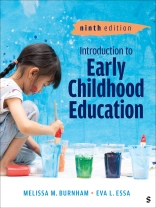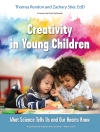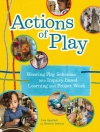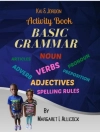Inspire your students to make a meaningful difference in the lives of young children and their families with
Introduction to Early Childhood Education, Ninth Edition. This text provides current and future educators with a highly readable, comprehensive overview of the field so students understand the many components of high-quality early childhood programs. At its core, the book emphasizes the vital role of professional early childhood educators in connecting with young children and creating programs that foster their learning and development. Authors Melissa M. Burnham and Eva L. Essa offer valuable insight by strategically dividing the book into six sections that answer the ’
What, Who, Why, Where, and How’ of early childhood education. Aligned with the latest NAEYC (National Association for the Education of Young Children) position statements, including the Professional Standards and Competencies for Early Childhood Educators, this supportive text provides students with the skills, theories, and practices needed to succeed and thrive as early childhood educators.
Spis treści
Preface
Acknowledgments
About the Author
Part I: The What Of Early Childhood Education
Chapter 1: The Scope Of And Need For Early Childhood Education
NAEYC’s Four Core Position Statements
The Growth of Early Childhood Education
What Are the Components of Early Childhood Education?
Defining Quality in Early Childhood Programs
Summary
Key Terms
Key Questions
Additional Resources
Part II: The Who Of Early Childhood Education
Chapter 2: The Children
Principles of Child Development and Learning
Children’s Uniquenesses
Working With Families of Young Children
Summary
Key Terms
Key Questions
Additional Resources
Chapter 3: The Families
Theoretical Perspectives on the Family
The Modern American Family
Family Strengths
Communicating With Families
Family Engagement
Summary
Key Terms
Key Questions
Additional Resources
Chapter 4: The Educators
The Early Childhood Educator
Staffing in Early Childhood Programs
Training Options and Requirements in Early Childhood Education
Professionalism
Current Issues and Dilemmas
Family Support for the Early Childhood Profession
Summary
Key Terms
Key Questions
Additional Resources
Part III: The Why Of Early Childhood Education
Chapter 5: Rationale Supporting Early Childhood Education
A Look Back—Children Through Time
Influential People in the History of Early Childhood Education
What Does Philosophy Have to Do with It?
Theory
Different Ways of Doing Early Childhood Education
Research on the Impact of Early Childhood Education
Summary
Key Terms
Key Questions/Applications
Additional Resources
Chapter 6: Accountability, Standards, and Assessment
Accountability: Program Standards and Assessment
Early Learning Standards for Young Children
Child Assessment: Informal Tools
Child Assessment: Formal Tools
Assessment Systems
Family Collaboration in Screening and Assessment
Summary
Key Terms
Key Questions
Additional Resources
Part IV: The Where Of Early Childhood Education
Chapter 7: The Physical Environment
Effects of the Physical Environment
Arranging the Indoor Environment
Arranging the Outdoor Environment
Environments for Different Ages and Abilities
Developmentally Appropriate Equipment
Developmentally Appropriate Materials
Screen Technology
Summary
Key Terms
Key Questions
Additional Resources
Chapter 8: The Social and Emotional Environment
Educator-Child Relationships
Centering Children’s Strengths
Recognizing and Understanding Children’s Stress and Trauma
Responsive Strategies to Support a Positive Social and Emotional Environment
Helping Families Cope with Stress
Summary
Key Terms
Key Questions
Additional Resources
Part V: The How Of Early Childhood Education—Curriculum
Chapter 9: Scheduling and Curriculum Planning
Components of the Early Childhood Schedule
Guidelines for Scheduling
Sample Schedules & Additional Considerations
Overview of Curriculum Planning
Approaches to Curriculum Planning
Engaging Families through the Curriculum
Summary
Key Terms
Key Questions
Additional Resources
Chapter 10: Creative Development Through the Curriculum
What Is Creativity?
An Environment That Encourages Creativity
Art Theories and Foundations
Visual Art Experiences
Music and Creative Movement Experiences
Supporting Creativity in Children of Different Ages and Abilities
Factors That Decrease Creativity
Family Values Regarding Creativity
Summary
Key Terms
Key Questions
Additional Resources
Chapter 11: Physical & Motor Development Through the Curriculum
A Framework for Understanding Motor Development
Components of Physical and Motor Development
Gross Motor Activities
Fine Motor Activities
Sensory Activities
Caring for the Body
Family Values Related to Physical Care and Development
Summary
Key Terms
Key Questions
Additional Resources
Chapter 12: Cognitive Development Through the Curriculum
Theories of Cognitive Development
Cognitive Tasks
Learning in the STEM Disciplines
Supporting STEM Learning in Children of Different Ages and Abilities
Families and Cognitive Development
Summary
Key Terms
Application
Additional Resources
Chapter 13: Language and Literacy Development Through the Curriculum
Theories of Language Development
Development of and Components of Language
Multilingual Learners
Language and Literacy in the Early Childhood Curriculum
Supporting Language and Literacy Development in Children of Different Ages and Abilities
Family Engagement in Language and Literacy Development
Summary
Key Terms
Key Questions
Additional Resources
Chapter 14: Social & Emotional Development Through the Curriculum
Theories Addressing Social & Emotional Development
Development of Emotional Competencies
Development of Social Competencies
Promoting Equity and Anti-Bias Education
Strategies to Promote Social & Emotional Competencies
Supporting Social and Emotional Development in Children of Different Ages and Abilities
Reflecting Families’ Cultures and Values
Summary
Key Terms
Application
Additional Resources
Part VI: The HOW of Early Childhood Education: Guidance
Chapter 15: Guiding Routines and Group Activities
Guiding Individualized Routines
Guiding Group Routines
Factors Affecting Group Behavior
Guiding Out-of-the-Ordinary Situations
Coordinating With Families About Routines
Summary
Key Terms
Key Questions
Additional Resources
Chapter 16: Positive Guidance for Behaviors that are Challenging to Adults
The Outcomes We Are Pursuing
Guidance Approaches
Factors Affecting Children’s Behavior
General Guidance Strategies
Strong Unmet-Needs Mistaken Behavior
When To Ask for Help
Working With Families Regarding Children’s Behavior
Summary
Key Terms
Application
Additional Resources
Pulling It All Together
Appendix: NAEYC Professional Standards and Competencies for Early Childhood Educators: Correlation Matrix
O autorze
Eva Essa, Ph.D., is a retired Foundation Professor at the University of Nevada, Reno, where she taught early childhood education and human development for 41 years. She received a Ph.D. in developmental psychology from Utah State University in 1978; an M.S. in human development and family studies (HDFS) from the University of Nevada, Reno, in 1971; and a B.S. in journalism from the University of Southern California in 1963. Dr. Essa’s research and writing on topics related to early childhood education have been published in a variety of professional journals and books.












